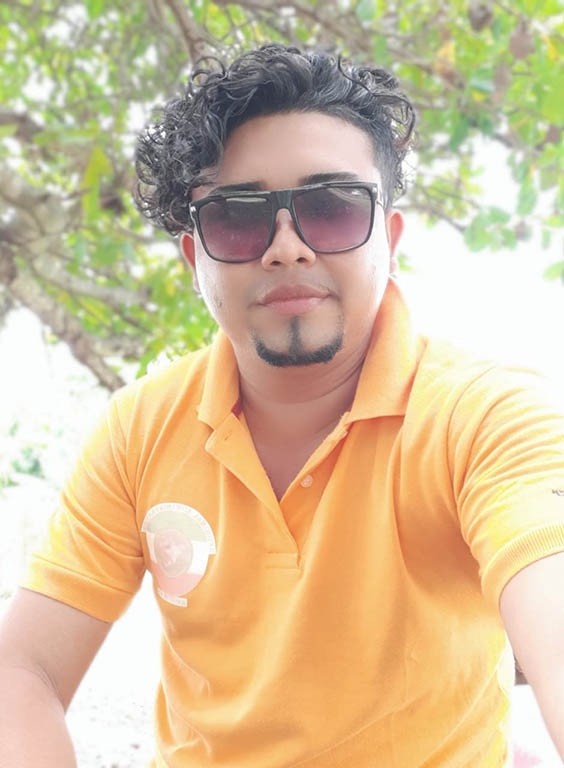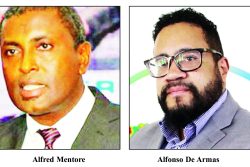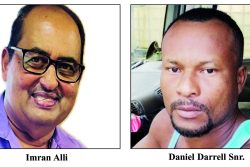As the novel coronavirus (COVID-19) continues to spread in the Upper Takutu/Upper Essequibo region, village leaders of Karasabai in the South Pakaraimas say that the community is being neglected by the authorities and this has resulted in the death of two elderly persons who were suffering from severe symptoms but were not being monitored because they were still awaiting their test results.
Region Nine has confirmed over 200 cases of COVID-19 with three of the positive patients dying after contracting the disease. Donna Greaves, a 25-year-old female of Lethem passed away at the Georgetown Public Hospital on July 5.
The other two deaths were recorded in August. The patients were identified as Alexander Leo, and Arnacette Nicholas, 78, both of whom are from the indigenous community of Karasabai.
According to Regional Councillor and resident of Karasabai, Marlon Edwards, who spoke on behalf of the village council, the first cases of COVID-19 were recorded in August and this was a result of persons travelling back and forth between Karasabai and a nearby Brazilian community.
Since then, the community has recorded 17 cases inclusive of the two deaths. Edwards said that both Leo and Nicholas had contact with someone in the village who had tested positive for COVID-19. As a result of this, they were tested but died before receiving their results.
Regarding Nicholas, he disclosed that relatives informed them that they had contacted the resident doctor and related the severity of the symptoms that she was experiencing. He stated that the doctor did not respond until two days later but by that time it was too late and she had already died.
“We were told that the doctor did not respond on time when informed about one of the patients, the female patient. She actually visited the patients like two days after and at that time it was too late because at that time she was already gone. We can say that negligence on the part of the doctors would’ve contributed to the death of one of the patients,” he stated.
Long wait
Relatives received the test results for the deceased weeks after they both died. Edwards stated that the long wait for COVID-19 test results is another major issue. In the case of the two deceased, he said, after they were tested, no one saw the need to check up on them even though they were elderly and considered one of the most vulnerable groups as it relates to contracting and dying from the virus.
He said that they understand that it would take time for results to return because the samples have to be transported to Georgetown but there should be a system in place to monitor elderly persons who were in contact with positive cases and had tested for COVID-19 but were yet to receive their results.
Edward said that nine of the 17 persons who tested positive for the disease in the community are elderly persons and although there is a doctor in the community, they are not being monitored. He stated that doctors from Lethem had visited their community to conduct testing but other than that nothing is being done to assist or advise the persons in isolation or quarantine. He added, “At the moment it is spreading quickly in the village, the numbers are rising. Karasabai is a very populated village. Approximately 1,900 persons [are] living here and the houses are very close together and there is no fencing around the homes and that sort of thing so persons move around from one house to the next very easily.”
The councillor noted that everyone who has tested positive so far has been placed in home isolation while family members are in quarantine at the same house considering that there is no isolation or quarantine facility in the community.
He added that another concern is the issue of families being placed in isolation and quarantine without the necessary items to sustain them during the quarantine or isolation period.
“What we have also noticed is that the authorities, the police and health personnel they have been putting people in quarantine without first ensuring they have enough food at home to sustain themselves. The people are not salaried employees, they live on a day-to-day basis, they go out fishing, go to the farms and that sort of thing and so it’s a daily living thing for them so to actually put them in quarantine, its causing a hardship upon the families.” He added that persons are being tested and after that they are left to fend for themselves even though they are being instructed to not leave the confines of their homes.
He noted that despite being one of the indigenous communities severely impacted by the coronavirus, no one has approached them to offer assistance with handling the virus.
Solar
In fact, he said, there has been little to no public awareness campaign about the disease in the community and this has placed the community at a huge disadvantage. He noted that while residents have access to the lone WiFi in the village, it is being powered by solar panels and does not have enough power on most days. In addition, they do not have access to cellular service, which is another problem altogether.
In a situation such as this, he said, it is very difficult for persons to make contact with health personnel when persons are extremely ill, hence why COVID-19 protocols particular to the community need to be in place.
“There is no reliable means of communication. I can say there haven’t been enough awareness programmes in the communities about the pandemic or virus. Residents do not have access to television [and] internet, they do not have access to radios, so the awareness aspect of it is very poor. Beside that the little awareness information that is available would be in English and residents here speak the Macushi language so the English language is a barrier for them,” he said.
Meanwhile, Edward said that illegal travelling between Guyana and Brazil remains a major issue in the area.
“We still have persons coming over the border illegally and that’s how the first case was imported. Karasabai village is very close to a Brazilian community and so we still have persons coming over from Brazil. Residents are continuing to travel between the countries is because there are a lot of persons from Karasabai working in Brazil and they have families in Karasabai so those persons would come over illegally to visit families or deliver foodstuff,” he said.
Edwards disclosed that there is one unofficial crossing that the Village Council is aware of and they have confiscated the boats that are usually used to transport persons to Brazil. He added that they had enlisted the Community Policing group to monitor areas close to the border but this is difficult because the border is much too vast to be monitored by a small group of people.
However, he said, since the new government was sworn in, members of the Guyana Defence Force were dispatched to the area and they are assisting with monitoring border crossings close to the community.
He noted that as a result of the rising cases, the village council recently imposed lockdown measures on the community. Edwards stated that no one is allowed to travel to Lethem or other surrounding areas without consulting the village councils. He also disclosed that the gates are open on Mondays and Fridays to ensure that food supplies are being brought into the village and buses are only allowed to transport a limited amount of passengers.
Edwards pointed out that the community is being affected economically since most persons usually sell their crops to neighbouring communities in Brazil, but because that no one is allowed to travel between the two countries, persons are suffering from loss of income.





